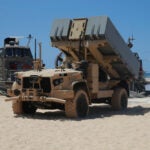
The Pentagon's office of industrial base policy has awarded contracts to three companies to strengthen the hypersonic and strategic systems' supply chain in the United States. On Apr. 28, DoD said that it awarded General Electric [GE] a nearly $8 million, 39-month contract to build high- and ultra-high temperature composites, modernize capital equipment, and increase aeroshell production at the GE Advanced Materials Center in Newark, Del. The Pentagon also said that it has awarded Carbon-Carbon Advanced Technologies a more than…














